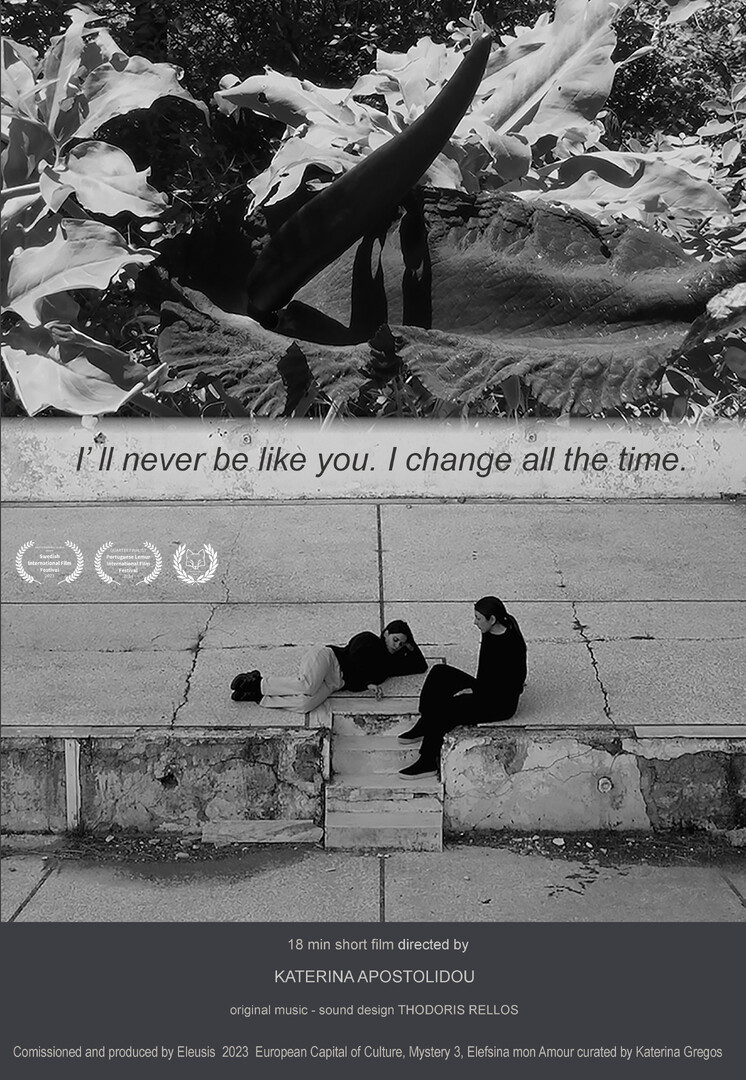I’ ll never be like you. I change all the time.
Film Info
Film Year: 2023
Film Duration: 18 min
Country: Greece
Language: Greek
Director
Katerina Apostolidou
Film Category
Synopsis
I’ll never be like you. I change all the time explores the limits and consequences of technological modernity in relation to human psychology as well as the concept of confinement and social stigmatization.
The work time (2023) takes place in the open-air theatre located inside the Dromokaiteion Psychiatric Hospital of Attica on Iera Odos (“The Sacred Way”), the main artery that connected Athens with Eleusis and the Thriasian Plain since antiquity whose history goes back to antiquity and Greek mythology.
Today it is largely an industrial area, hosting some of Greece’s major industrial facilities, such as its largest oil refineries and steel mills, as well as being rapidly being transformed into a logistics hub.
In 1961, the psychiatrist George Lyketsos staged Aeschylus’ ancient tragedy Prometheus Βound in the open air theatre of the Psychiatric Hospital (built in 1958), performed by the inmates.
This connection between the ancient Promethean myth and the psychotherapeutic process was the starting point for linking the symbolic figure of Prometheus with the identity of the city of Eleusis from antiquity to the present day .
The video posits, on the one hand, the tragic hero of Aeschylus, who in Greek mythology has a dual origin and role, as the benefactor of humanity, god of arts, fire, potter and metallurgist, but also as the cause of man’s suffering whose rebellion and punishment are linked to themes of disobedience and conflict and on the other hand, Eleusis with its emblematic archaeological history, and its industrial past and present.
The emblematic references to antiquity and the deluge of industrial development seem to be the two faces of Elefsina, which from the late 19th and most of the 20th century was well aware of the extortionate consequences of its industrialization.
Fragments from different texts are heard such as Aeschylus – Prometheus Bound – but also from Kafka, Heiner Müller, John Christopher Müller, Kerenyi, Jean-Paul Vernant, Bergman (Personna), Zamyatin, as well as industrial memories of Eleusinian workers and excerpts of a dialogue with a bot.
The video weaves a poetic correlation of the outdoor theatre and readings from this combination of literary, philosophical and cinematic references.
Through an elliptical visual narrative, between the space and two female figures – a parallel connection to Demeter and Persephone or Elisabeth and Alma from Ingmar Bergman’s film Persona – a multiple field of interpretation, identification – social as well as personal – is opened up through time in which the different faces of Eleusis past, present and the potential future, emerge.
The complex narrative, complemented by a polyphonic chorus** and the music of Thodoris Rellos outline the two faces of Elefsina, the primordial and the contemporary which intersect and merge.
As is the case with Demeter and Persephone or with Alma and Elizabeth in Persona.
Kerenyi speaks of one and the same person when he refers to Demeter and Persephone, the daughter who becomes mother and daughter again, in the perpetual natural law.
This dual relationship also reverts to the image of the film that is divided into two parts and again becomes one as the narrative progresses.
The title of the play, a phrase from Alma the young nurse to Elizabeth, the famous actress who chooses silence, metaphorically recognizes in the identification of the two women the two faces of Eleusis and brings the question to the present reality, to new challenges.
The “Promethean” Eleusis has felt in her body the unanswered “empty” imprint of the industrial development of the last century and the “shame” when the Promethean gift turned into punishment and destruction, into amnesia and obscurity.
In the play, the screen of the theatre functions as a mirror of the other world where the Acheron, the turbulent waters in the cistern of the Old Olive Factory that lead the gaze both down and up, and the coming of spring that welcomes Persephone with swallows every year…
There is also a re-enactment of the scene at the end of Bergman’s film in which the phrase I will never be like you, I am constantly changing, ending with a whisper, the word Nothing, open to all that can possibly occur…
*The title is issued from Ingmar Bergman’s script for the film Persona (1966).
**Participation of the Center for Mental Health Korydallos, Dromokaiteio Psychiatric Hospital.


